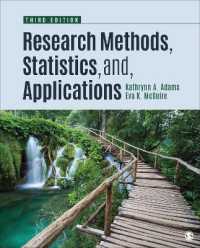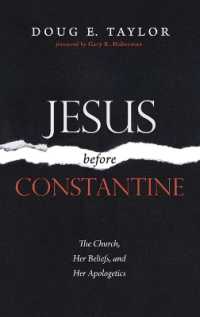- ホーム
- > 洋書
- > 英文書
- > History / World
Full Description
National Jewish Book Awards Winner
of the Anthologies and Collections Award, 2009.
Europe has changed greatly in the last century.
Political, social, and ideological transformations have not only redrawn the
map of the continent but have rewoven the fabric of its culture. These changes
have nourished widespread reassessment in European historical research: in
terms of its presuppositions, its methodologies, its directions, its emphases,
and its scope. The political boundaries between nations and states, along with
the very concepts of 'nation' and 'boundary', have changed significantly, and
the self-consciousness of ethnic minorities has likewise evolved in new
directions. All these developments have affected how the Jews of Europe
perceive themselves, and they help to shape the prism through which historians
view the Jewish past.
This
volume looks at the Jewish past in the spirit of this reassessment. Part I
reconsiders the basic parameters of the subject as well as some of its
fundamental concepts, suggesting new assumptions and perspectives from which to
conduct future studies of European Jewish history. Topics covered here include
periodization and the definition of geographical borders, antisemitism, gender
and the history of Jewish women, and notions of assimilation. Part II is
devoted to articulating the meaning of 'modernity' in the history
of European Jewry and demarcating key stages in its crystallization.
Contributors here reflect on the defining characteristics of a distinct early
modern period in European Jewish history, the Reformation and the Jews, and the
fundamental features of the Jewish experience in modern times.
Parts III and IV present two scholarly conversations as case studies for the
application of the critical and programmatic categories considered thus far:
the complex web of relationships between Jews, Christians, and Jewish converts
to Christianity (Conversos, New Christians, Marranos) in fifteenth-century
Spain; and the impact of American Jewry on Jewish life in Europe in the twentieth
century, at a time when the dominant trend was one of migration from Europe to
the Americas.
This
timely volume suggests a new framework for the study of Jewish history and
helps to contextualize it within the mainstream of historical scholarship.
CONTRIBUTORS: Ram Ben-Shalom, Miriam Bodian, Jeremy
Cohen, Judah M. Cohen, David Engel, Gershon David Hundert, Paula Hyman, Maud
Mandel, David Nirenberg, Moshe Rosman, David B. Ruderman, Daniel Soyer
Contents
Note on Transliteration
Introduction - Jeremy Cohen
Part I Reorienting The Narrative
1 Jewish History Across Borders - Moshe Rosman
2 Away from a Definition of Antisemitism: An Essay in the Semantics of Historical Description - David Engel
3 Does Gender Matter? Locating Women in European Jewish History - Paula Hyman
4 Assimilation and Cultural Exchange in Modern Jewish History - Maud Mandel
Part II From the Middle Ages to Modernity
5 Jewish Culture in Early Modern Europe: An Agenda for Future Study - David B. Ruderman
6 The Reformation and the Jews - Miriam Bodian
7 Re(de)fining Modernity in Jewish History - Gershon David Hundert
Part III On the Eve of the Spanish Expulsion
8 Spanish 'Judaism' and 'Christianity' in an Age of Mass Conversion - David Nirenberg
9 The Social Context of Apostasy in Fifteenth-Century Spanish Jewry: Dynamics of a New Religious Borderland - Ram Ben-Shalom
Part IV From Europe to America and Back
10 Transnationalism and Mutual Influence: American and East European Jewries in the 1920s and 1930s - Daniel Soyer
11 Transplanting the Heart Back East: Returning Jewish Musical Culture from the United States to Europe - Judah M. Cohen
Notes on Contributors
Index







